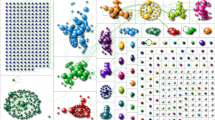Abstract
The paper reports a case study assessing asynchronous text-based online discussion amongst trainee teachers in Britain. It describes the project as working ‘along the grain’ of current technology and educational culture since it aims to exploit the capabilities of the ICT used (e.blackboard1) in ways which could be enacted in schools today whilst at the same time giving due attention to modify the constraints of time, place and hierarchy that the ICT revolution threatens in schools. Quantitative and qualitative results are discussed. The relationship between ICT and the wider social, political and cultural context is also discussed. The paper concludes with areas for further research and points to the need to review current assessment cultures in schools.
Similar content being viewed by others
References
Austin, N. (2003) Bigger proves better. Guardian: educ@guardian, supplement, 23 September, p. 9.
Aviram, A. (2000) From 'computers in the classroom' to mindful radical adaptation by education systems to the emerging cyber culture. Journal of Educational Change, 1, 331–352.
Borthwick, A. and Jones, R. (2000) The motivation for collaborative discovery learning online and its applications in an information systems assurance course. Issues in Accounting Education, 15(2), 181–210.
Course Booklet (2002) University of Bath History PGCE Booklet. University of Bath, Bath.
Gendron, B. (1997) Technology and the Human Condition. St. Martin's Press, New York.
Hawkey, K. (2003) Social constructivism and asynchronous text-based discussion: A case study with trainee teachers. Education and Information Technologies, 8(2), 165–177.
Hawkey, R. (2002) The lifelong learning game: Season ticket or free transfer? Computers and Education, 38, 5–20.
Herring, S. C. (2004) Slouching towards the ordinary: Current trends in computer-mediated communication. New Media and Society, 6(1), 26–36.
Holmes, D. and Russell, G. (1999) Adolescent CIT use: Paradigm shifts for educational and cultural practices? British Journal of Sociology of Education, 20(1), 69–78.
Ismail, J. (2001) The design of an e-learning system: Beyond the hype. The Internet and Higher Education, 4(3/4), 329–336.
Jordan, T. (1999) Cyberworld. Routledge, London.
Kenway, J. and Bullen, E. (2001) Globalising the young in the age of desire. Paper presented at the Travelling Policy Local Spaces Conference. Keele University, June.
Key Stage Three National Strategy (2002) Department for Education and Skills, London.
Macdonald, J. (2003) Assessing online collaborative learning: Process and product. Computers and Education, 40(4), 377–391.
Negreponte, N. (1995) Being Digital. Random House, New York.
Pear, J. and Crone-Todd, D. E. (2002) A social constructivist approach to computer-mediated instruction. Computers and Education, 38, 221–231.
Pena-Shaff, J. B. and Nicholls, C. (2004) Analyzing student interactions and meaning construction in computer bulletin board discussions. Computers and Education, 42(3), 243–265.
Roth, W. M., Tobin, K., and Zimmermann, A. (2002) Co-teaching/cogenerative dialoguing: Learning environ-ments research as classroom praxis. Learning Environments Research, 5, 1–28.
Schofield, J. (2003) How their kids will learn. Guardian: Classroom of the Future, supplement, 23 September, p. 18.
Selwyn, N. (2003) Schooling the mobile generation: The future for schools in the mobile-networked society. British Journal of Sociology of Education, 24(2), 131–144.
SOED (1933) Shorter Oxford English Dictionary, reprinted with corrections, 1972. Oxford University Press, Oxford.
Somekh, B. (2000) New technology and learning: Policy and practice in the UK. Education and Information Technologies, 5(1), 19–37.
Tu, C.-H. (2001) How Chinese perceive social presence: An examination of interaction in an online learning environment. Educational Media International, 38(1), 45–60.
Williams, R. and Edge, D. (1996) The social shaping of technology. In Information and Communications Technology, W. H. Dutton (ed.). Oxford University Press, Oxford.
Author information
Authors and Affiliations
Rights and permissions
About this article
Cite this article
Hawkey, K. Assessing Online Discussions Working ‘Along the Grain’ of Current Technology and Educational Culture. Education and Information Technologies 9, 377–386 (2004). https://doi.org/10.1023/B:EAIT.0000045294.49420.1c
Issue Date:
DOI: https://doi.org/10.1023/B:EAIT.0000045294.49420.1c




